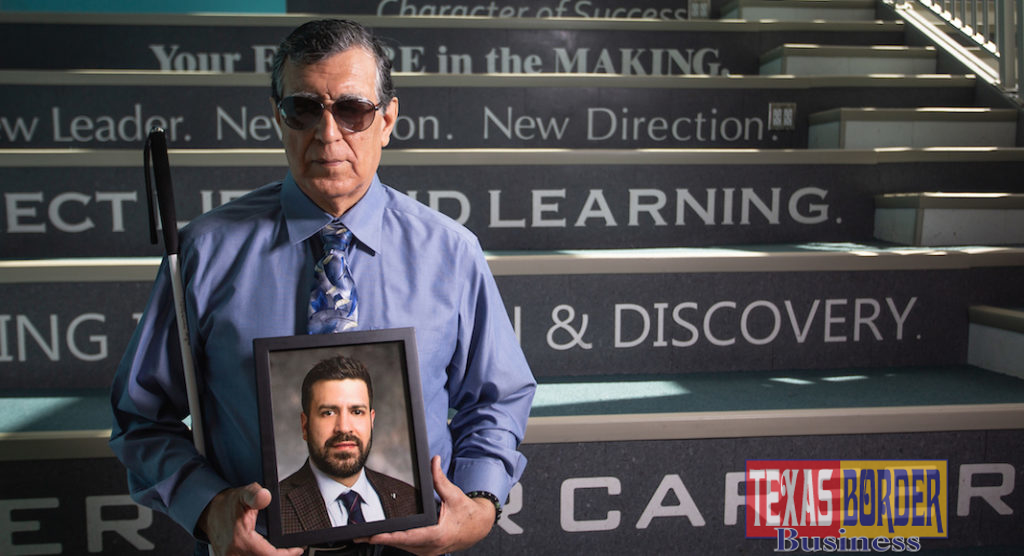
Texas Border Business
MCALLEN, TX (June 14, 2019) When he was a kid, Noel Ysasi wanted nothing more than to play catch with his dad. But as much as his dad tried, their ball-playing sessions always ended in exasperation.
Noel Ysasi, Sr. was born with a curvature of the retina, which resulted in blurry vision. At age 8, a severe case of the measles robbed him of all the sight in his right eye. He struggled in school as his vision gradually declined, and by 2003 he was blind to everything except light and shadows.
At age 12, Ysasi Jr. remembers being disappointed, frustrated, and upset over his father for his inability to engage in extracurricular activities with him. Ysasi Jr. explained to his father his desire to learn to play basketball, baseball, and football, but never had someone to teach him. “You see, we lived in a rural area with no neighbors, and if we watched a game on TV, nobody was able to teach me the rules of the game,” Ysasi Jr. says. One day, his father heard him, and they went outside to play a round of catch. His father didn’t catch one ball that day and he always threw the ball in a direction far from where his son was positioned.
“And I will admit, I was upset,” Ysasi Jr. says. “I was upset over the fact that I didn’t have anyone to play with and I didn’t have a father to teach me the kinds of things that I wanted to learn. At that time, I was unable to understand his level of vision loss. Since he wore glasses, I figured his vision would at least allow him the opportunity to play catch. I think a primary reason for this assumption was that my father never showed any weakness. He never cried, he was quite stubborn, and he was very strict.” So as most children do, the son looked at his father as if he were Superman.
“I had no idea what he struggled with until years later,” the younger Ysasi says. “However, after playing that round of catch, I saw a look of disappointment in my father; not at me, but at himself. A few days later, he came to me and said, ‘I know I can’t play catch and I can’t play basketball, but I know how to wrestle and if you want, I can teach you.’ From that day on, I looked forward to every wrestling match we had and I think I took him down maybe once or twice.
“What was so amazing was that my father began to teach me at such an early age the value that each person holds: that you should never focus on a person’s weakness, but rather on their strengths,” Ysasi Jr. says. When I think of my father, an enormous sense of pride comes over me. My father may be blind, but he had a clear vision of how to be a husband and dad. My mother and father always provided, they put food on the table, they instilled the value of an education, took the time to listen, and never gave up on their children; regardless of how difficult they may be.”
Finding Inspiration
After high school, Ysasi Jr. spent four years in the Navy as a boatswain’s mate stationed in Norfolk, Virginia. He returned to Texas and enrolled in South Texas College, earning an associate’s degree in social behavioral sciences.
“My mother was an elementary school teacher, and my father was a social worker, so it seemed like a natural fit for me to go into school psychology,” he recalls. He earned bachelor degrees in psychology and sociology at The University of Texas-Pan American with the aim of doing just that.
Ysasi Jr. then completely changed career paths after a job interview his father had. “I was waiting in the car for my father to return and once he did, he was quite emotional,” the son explains. “He told me that during the interview, the employer was curious to know how he could provide counseling services to clients if he couldn’t see them. Once the interview was over, he was trying to find the exit to the door, and nobody offered any assistance; he finally found the exit after five minutes. To a person who is visually impaired or blind, one minute can seem like an eternity in a situation like that. In that situation, the employer did the same thing that a 12-year-old boy did; he chose not to look at his strengths despite his extensive career as a social worker.”
Even though he was halfway through his master’s degree, Ysasi Jr. chose a career path that he felt he was destined for: rehabilitative counseling. This specific practice of counseling aims at maximizing employment and/or independence among individuals with disabilities, he explains. “A core philosophy of our profession is geared toward focusing on a person’s strengths; something that clearly has been engrained since childhood,” he says. Ysasi Jr. has since gone on to earn a PhD in rehabilitation counseling from The University of Texas-Pan American.
Did his father’s disability and subsequent experience with discrimination influence his career choice? “No question about it,” Ysasi Jr. says. “Both my mother and father instilled the idea of striving for excellence in my sisters and me. But my father has had to overcome so much adversity, and I learned from him that a physical problem is no excuse to take a backseat.” Knowing his father had much to offer, and recognizing the limits others were putting on him because of their misguided perceptions of his abilities, spurred him on with the goal of helping others in the same position.
Experience Exceptional
Ysasi Sr. parlayed his years of experience into a teaching position at South Texas College, where he has been a beloved instructor of social work since 2003. It’s a job that takes advantage of his greatest strength: his years as a social worker in almost any setting imaginable.
“I worked at the Department of Human Services, in hospitals and nursing homes, in a psychiatric setting, and with adolescents who had drug or alcohol problems. I’m able to use all that I’ve learned in those settings to talk in class about cases and examples that go beyond a textbook,” the elder Ysasi says. “My students love it when I come up with real-world experiences from my years as a social worker.”
And that real-world experience is the secret sauce that turns a good teacher into a standout teacher. Professor Ysasi recalls a time a student observed that social workers help just the poor and vulnerable. “I told him that is only partially true, but even well-to-do people might need a social worker for something like help with advance directives in a hospital setting, or with an addiction or psychiatric problem. I’ve worked with people from all walks of life, from the very poor to the very wealthy.” Sometimes, he says, you just don’t know who will come into your orbit.
“We talk in class about working with adolescents,” he continues. “A lot of adolescents feel they’ve failed themselves and their parents, they see themselves as losers. This is where you teach the strengths perspective. You may have to pry [their talents] out of them. It takes time, but self-esteem and confidence will follow. You help them find their strengths in order to empower them.”
His vision impairments make teaching more challenging. Professor Ysasi has to do quite a bit of preparation for each class since he can’t count on the visual cues that others take for granted. “I go through my notes and PowerPoints when I prepare, but then I have to rely on memory when I get in front of the class,” he says. Technology helps. His laptop is equipped with a screen reader that “reads” the words aloud, and he listens through a headset. A Scantron allows him to quickly correct multiple-choice quizzes.
A Family Affair
Clearly, this is a family that doesn’t let a little adversity stand in the way of getting things done. “I think of my son, and I admire his ability to focus. He didn’t allow anything to hold him back from getting his master’s and PhD, and I’m extremely proud of him for that,” says Professor Ysasi. He can’t help adding that Ysasi Jr. was honored with Doctoral Student of the Year by two national organizations prior to graduating.
Ysasi Jr., now an assistant professor at Northern Illinois University, says his father is the reason he is so self-driven. “He’s 72, and teaches five to six classes a semester, and has had to overcome so many challenges, yet he is dedicated to ensuring that each student receives a quality education. He goes through each of their papers and gives them solid feedback because he wants them to strive toward excellence.”














